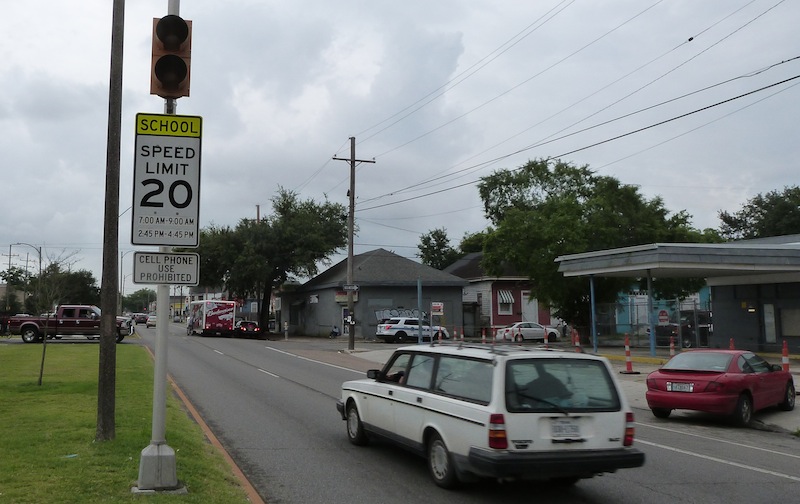
The Central City school-zone light flashing at 1 p.m. Wednesday had two distinct problems that have bedeviled the city system meant to keep kids safe: It was the wrong time of day, and the nearby school was on Mardi Gras break.
It appears the city is finally addressing its chronically broken school-zone light system with help from red-light camera ticket giant American Traffic Solutions, which has agreed to develop a timing solution at no cost.
A one-year cooperative endeavor agreement, signed by Mayor Mitch Landrieu on Jan. 29, was effective Sept. 15, 2015. According to the document, the company will design a solution to “the problem of the City’s school zone lights flashing at improper times,” beginning with an unspecified pilot location and then expanding to other school zones.
A spokesman for Mayor Mitch Landrieu said no work under the agreement has been performed yet, despite being backdated nearly five months.
But spokesman Hayne Rainey said in an email that the city’s Department of Public Works has done work on its own.
“DPW determined that several school zone flashers were not activating on time,” he said in an email. “After troubleshooting this problem, it was determined that the timers in the signals needed to be replaced. Repairs have been completed.”
About 30 percent of school-zone lights are backed up by traffic cameras. City officials say they don’t issue tickets for zones where the warning lights are malfunctioning, and it’s unclear how much the city has lost in revenue as a result.
They may have been replaced, but they’re not being put to use. The same Central City light was malfunctioning Thursday.
An American Traffic Solutions spokeswoman referred The Lens to a local representative who did not return a call. The agreement is in the city’s public contract database.
A cooperative endeavor agreement is different from a contract in some ways, and one goal is to provide a benefit to each party. The city and American Traffic Solutions each has a financial interest in getting the warning lights working.
American Traffic Solutions has had a contract with the city since 2007 to manage about 65 traffic cameras that police use to issue red-light, general speeding and school-zone related tickets. A 2008 nola.com article reported the company gets $30 a piece for the first 150 tickets issued by a camera each month and collects a smaller fee on additional tickets.
Over time, the company’s cut of citation fees appears to have increased.
The original 2007 contract says its fees per ticket will increase 3 percent each year. The company also receives 27 percent of total collections from delinquent citations. But the initial fee that those percentages build on is listed in the company’s bid, not the contract, and the bid is not available on the city’s website. The Lens requested more precise numbers last week but the city has not provided them.
About 30 percent of school-zone lights are backed up by traffic cameras. City officials say they don’t issue tickets for zones where the warning lights are malfunctioning, and it’s unclear how much the city has lost in revenue as a result.
The lights are not required by city law — the city’s signage alone is enforceable — but flashing lights have proven to help alert and slow down drivers.
The city must hold up its end of the agreement by maintaining the school-zone lights, something it is charged with regardless but has failed to do. The company will work on the timing mechanisms, but the city has to be sure the rest of the equipment is working.
In the past, the city has said the batteries have been low or the lights burned out. The city also blamed cloudy weather, saying the sun hadn’t been shining enough for their solar panels to properly charge the batteries.
One year ago, The Lens surveyed school zone lights and found more than half of them were malfunctioning — flashing at the wrong time or not at all, while others were faint, blocked or otherwise hard to see. In some cases, the solar panels were facing the wrong way.
According to the city’s bid specifications, the system was supposed to be remotely controlled and hold up to 500 days of programming for lights. It also required unique scheduling for each zone, which is especially important to a city chock full of charter schools with differing calendars. The winning bidder, Jack B. Harper Electrical, installed Carmanah equipment that met those specifications. Harper installed lights at a cost of $1.3 million, which FEMA covered as part of the Hurricane Katrina recovery. The company maintained the lights through 2011 when the Department of Public Works assumed responsibility.
After the Lens’ first report, city officials said they would address the problems, linked partially to a broken transmitter. A second review of the lights in May found slight improvement, but more than half still broken.
The city promised to fix the lights by the time school resumed in the fall. A survey by The Lens in early September found 61 broken lights. While that was an improvement from the 87 broken in January, and 78 malfunctioning in May, it still meant about half the lights weren’t working.
On Oct. 2 The Lens reported the problematic lights to the city’s 311 department.
Rainey said the Department of Public Works is constantly monitoring and repairing the lights.
“At this time, DPW is still replacing batteries and adjusting solar arrays as needed,” he said.

